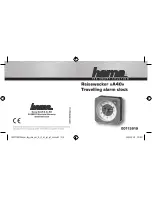
2.2 Front Panel Controls and Indicators
5
2.2.1
Command Key Definitions
Figure 2.2 illustrates the keypad and annunciator LED placement on the clocks. The details below
provide additional description for each of these keys.
SETUP
TIME/DATE
DOWN
ANTENNA
UP
TIMING
ENTER
SYSTEM
NORMAL
LEARN
UNLOCKED
ALARM
OPERATE
POWER A
POWER B
FAULT
Figure 2.2: Keypad and Annunciator LEDs (LEARN is labeled SURVEY on the 1200B)
TIME/DATE
: Press to change the display(s) to the desired mode. There are four modes available
and repeatedly pressing this key will scroll through all modes. Changing the time display
does not effect time data of the rear-panel timing outputs.
ANTENNA
: Press to view the antenna status (indicating antenna voltage and current), GNSS
satellite tracking information, longitude, latitude, and elevation of the antenna location
according to the most recent position fix.
TIMING
: Press the to view the clock status, time quality (in time deviation and sigma),
estimated holdover uncertainty and event/deviation values.
EVENT/DEVIATION
displays up
to 50 event records, or continuously updates the 1 PPS deviation data.
SYSTEM
: Press the system key to view the clock serial number and firmware version, power
supply voltage(s), EEPROM status, faults, and option board information.
SETUP
: Press SETUP to invoke a series of menus used to adjust configurable parameters
within the clock. In numeric data entry mode, moves the cursor to the left. Allows security
lockout.
UP
: Used in conjunction with other menus for selection, to adjust values upward, or to scroll
upward through the available menu choices. Also assists in navigating through main setup
menus in normal order.
DOWN
: Used in conjunction with other menus for selection, to adjust values downward, or
to scroll downward through available menu choices. Also assists in navigating through main
setup menus in reverse order.
ENTER
: Used for confirming changes made within Setup menus. Generally, pressing
ENTER
also advances to the next parameter, or returns to a higher menu level. In numeric data entry
mode, moves the cursor to the right.
2.2.2
LED Status Indicators
Figure 2.2 also illustrates the eight LEDs that provide information about the operational status
of the instrument. For normal operation, with the clock locked and accurate, the
OPERATE
LED
and
POWER A
and/or
POWER B
LED should be lit. While the clock is collecting position and
timing information the
LEARN
LED may be lit and the
NORMAL
LED may be off. The following
definitions apply to these indicators:
















































